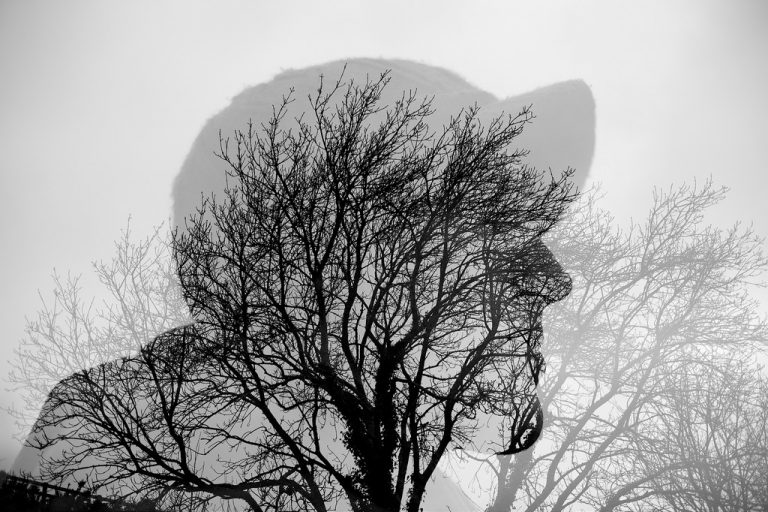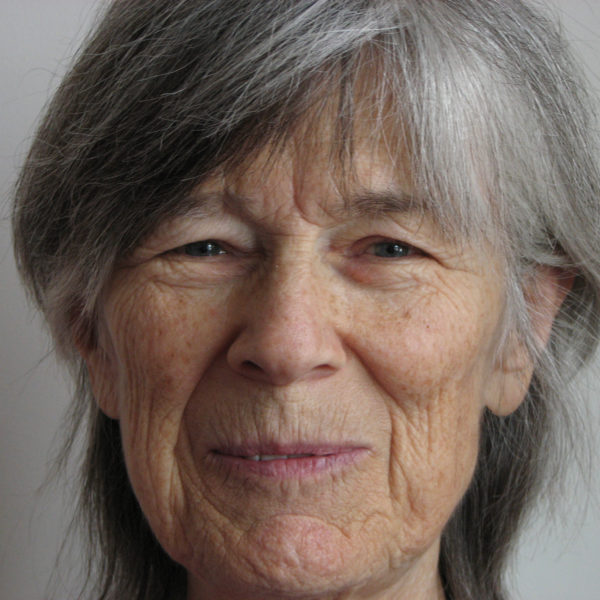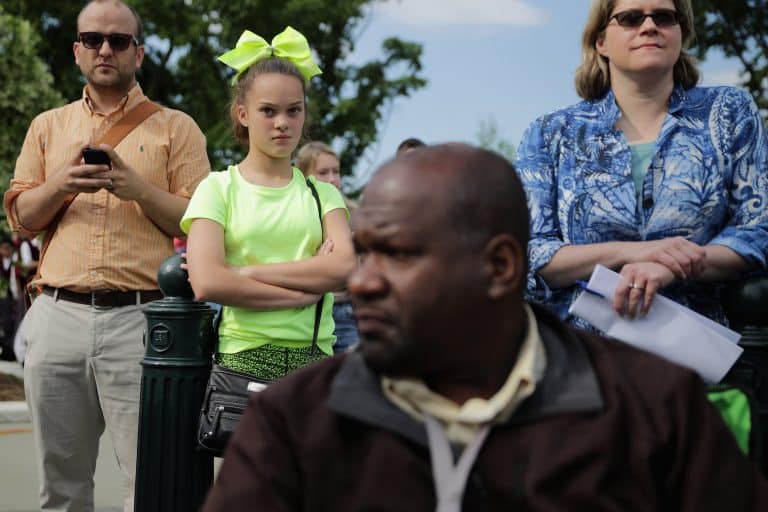
Image by Naomi Pincher/Flickr, Attribution-NonCommercial-NoDerivs.
We Can’t Move Forward Without Looking Back
“To walk safely through the maze of human life, one needs the light of wisdom and the guidance of virtue.”
So says Buddha. Which is a fitting way for me to introduce you to Louise, my 78-year-old neighbor and friend. She’s a writer, a teacher, and a Buddhist activist. She’s, quite possibly, closed the gap between how she lives and what she believes more than any other human I’ve ever encountered.
Even when it comes to race — a place where so many otherwise impassioned white activists, especially of a certain age, have deep moral failings. Louise may have failed, she may continue to fail in various ways, but she has no delusions about her culpability or the ways in which her freedom is tied up in taking responsibility.
As this letter demonstrates, she is committed to telling truth about her own family’s story and how it’s wrapped up in the larger national history of racialized violence and economic exploitation. She’s teaching me, through these words and her actions, how to walk the maze of human life with more courage, especially at this cataclysmic moment.
Dear Courtney,
Just last summer we were on the deck at my family’s place in the woods — you and me and your two little girls — waiting for our friends to arrive for a picnic. Enjoying the dry, hot air, cooled just a little by huge spreading live oaks — a perfect northern California day on the edge of the Napa Valley. We were on this futon where my mother used to sleep outdoors with her grandchildren. Baby Stella had sprawled out dozing and I was telling Maya about sleeping here and sometimes seeing wild animals. I was about to go on about bobcats and skunks, when she startled both of us.
“I see a animal,” she said in her confident three-year-old voice, looking out towards the field. Hardly believing her, I turned and followed her gaze beyond the dark arms of the oaks. And there he was, not ten yards away, lying in a patch of shade surrounded by sunlight — a little buck with upright horns. He looked so peaceful, resting there in the heat of the day, and didn’t seem to mind our excitement, how we passed the binoculars to Maya, showed her how to use them, and praised her clear seeing, marveling at her openness to the natural world.
Next time you’re here with Maya, we have to figure out how to tell her some of the history that surrounds this place. It’s hard to know how the land can be so lovely and peaceful. It’s “ours” only because my great, great grandfather bought it during the terrible period after statehood when the early people of California were being hunted down in what we would later name genocide. So far as I know he wasn’t in any of the militias that wiped out peaceful villages, killing women and even babies in ways too horrible to tell Maya.
But he was in the state legislature when they voted to pay those militias, and likely shared the common view that Indians should be “exterminated” from land that hadn’t already been cleared. That was their code for genocide at the time. I’m guessing my ancestor voted in 1860 — right before the Civil War — to strengthen state laws that permitted kidnapping and sale of Native children into indenture — which was really slavery. Even though he was a union supporter, the census for that year listed two people who were likely indentured Indians living in his own home. In a nearby town, an observer said almost every household had one to three Indian child servants.
California was particularly violent, but the story holds true in different ways throughout the country, whether our white ancestors were actually there for the killing or immigrated later and moved into places that had been conquered. Free land, some of them thought. We know the real story in our hearts but don’t want to look at it. There’s too much fear and grief. But not acknowledging keeps us locked into self-destructive patterns. We’re living with the kind of shadow Jung talked about — played out in our political life, denial of climate change, and lack of true respect for darker-skinned people. As long as we don’t look back, the wound deepens and we can’t move forward. Like with PTSD.
Under the oaks last summer, we hadn’t known the election outcome or seen how deeply into this shadow our country would move. And now, we’re reeling from it, casting about — so many of us — to see how we can step up our good work, our resistance to new waves of atrocity. Now things look very hard, with a government that seems not to care about the earth or understand that none of us can be free (or our country “great”) unless we embrace those who’ve been left out and repair the harm done to them.
You tell me I have wisdom to impart — maybe because I’m nearly 80 and have spent over half my years focusing on this racial karma. Your trust is a little daunting to me. I’m just as subject to dread as anyone else — perhaps because I know too much about what we’re historically capable of, what some of our revered founding fathers specifically did that has never been grieved or repaired. But I can tell you what I’m doing and encouraging others to do.
- Gather with others. We need to sit down with other people, especially other white people — in person if possible — to share our fears, our heartbreak, and the steps we’re taking. As you know so well, this is where real understanding develops, and the power to move forward.
- Look even more deeply for colonial mind in ourselves. No matter how many friends, courses, or roommates of color we’ve had as white people, there’s more to learn, ways to grow beyond guilt and discomfort into compassion and understanding. One good way is to look back into our own histories on the continent: when did our people immigrate and how did their stories mesh with the narrative of colonization? This makes for great discussion when we gather. After all these years, I still need more looking deeply. Right now I’m stuck about talking to a particular white person whose superior attitude caused some real harm. Why can’t I just tell her about it? To me this says I, myself, still have some of that same colonial mind that I see in others. When I can forgive my own mistakes and love myself, I’ll be free and able to talk with love and equanimity to anyone. But it’s a long process.
- More action than before, especially local action. I don’t mean we should all get busier, but these next four years call us to keep our history in mind in every action and to find new ways to focus our longstanding interests. I’m rethinking my own projects and looking for ones that bring it home to where I live. I’m excited that young friends have returned from Standing Rock fired up about what tribes lived here in our area, what their issues are now, and how to support as allies. The Ohlone people have been organizing for years here to gain a land base and preserve the oldest sacred site in the Bay Area from development. Now many new supporters are showing up to help.
- Remember that positive change is happening. Watching how racial karma affects our body politic and researching family history in the light of genocide can be discouraging, but when you look closely, there are enormous shifts in consciousness. We’re not stuck. Looking back to some of the little known stories of the Civil Rights Movement and the women’s movement, people before us changed some very deep attitudes. And when I worry about how hard it is to decolonize the very mind of a society, I think about how it’s actually been happening over the generations in my own family. Starting with the great, great grandfather who bought this land — so deeply grounded in the racist thinking of Manifest Destiny. Nothing changed much in the next generation, but then my grandmother’s views shifted just a little, and her sons began to express some real questions. On the other side, my mother — descended from slaveholders — became the only white mom I knew in the 1950s who would speak up against the “n-word” whenever she heard it. Consciousness changes are happening right in our own families. Seeing these slow-moving changes in collective consciousness humanizes my ancestors for me and even makes them lovable. Some traditions even say these ancestors are trying to help us undo the harm of their legacy.
And what a time to be doing decolonizing work in America! Dozens of groups are finding remarkable new ways to look at white peoples’ complicity, without the guilt-tripping of the old ways. Ta-Nehisi Coates has affected us; white people really are starting to wake up.
Many say we wouldn’t be doing these things with the same passion and urgency if another candidate had been elected. We wouldn’t be finding the ways to deal with our founding wounds that I think we’ll see in the next four years — not in the headlines maybe — but in our hearts and our grassroots institutions. Four years from now — 2020, when our next president is inaugurated — will also be the 400th anniversary of the Mayflower’s landing at Plymouth, a time that was far more traumatic for both colonists and Indigenous than our schoolbook histories say. As we hold the ground in our democracy, this coming four years will be a good time for us to collectively look back and change the public narrative, which will mean we can really move forward.
And I hope that will be a story we can share with Maya the next time we’re up in the woods.



